The Tennis Conversation: Tim Henman
By Matt Fitzgerald May 21, 2021Darren Cahill: Jannik Sinner watches more Carlos Alcaraz matches than he does with any other player
By TENNIS.com Jul 14, 2025Jannik Sinner reignites Carlos Alcaraz rivalry with Wimbledon victory
By Pete Bodo Jul 14, 2025Jannik Sinner reversed his usual pattern against Carlos Alcaraz. It won him Wimbledon
By Steve Tignor Jul 14, 2025Veronika Kudermetova and Elise Mertens win women's doubles title at Wimbledon
By Associated Press Jul 13, 2025Joy to the World: What Carlos Alcaraz has, and what we are enjoying
By Peter Bodo Jul 13, 2025Iga Swiatek keeps surprising herself after Wimbledon title caps "surreal" turnaround on grass
By Steve Tignor Jul 12, 2025Iga Swiatek wins first Wimbledon, sixth Grand Slam title with 6-0, 6-0 rout of Amanda Anisimova
By Ed McGrogan Jul 12, 2025Wimbledon men's final preview: Will Carlos Alcaraz, Jannik Sinner share another epic?
By Steve Tignor Jul 12, 2025Julian Cash, Lloyd Glasspool become first all-British pair to win Wimbledon men's doubles title since 1936
By Associated Press Jul 12, 2025The Tennis Conversation: Tim Henman
The former world No. 4 dives into an extended chat about the upcoming 2021 season, his Olympic and retirement experiences, and unique texts with coach Paul Annacone.
Published May 21, 2021
Advertising
The former world No. 4, who currently serves on the AELTC's board, dives into an extended chat about the upcoming 2021 season, hopes for greater collaboration within the sport, his Olympic and retirement experiences, "thirsty" evenings and unique communication with Paul Annacone.
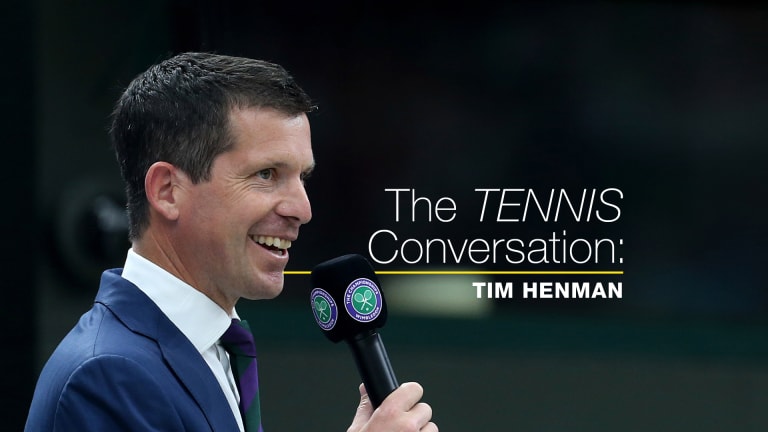
The Tennis Conversation: Tim Henman—Wimbledon, wine & Wedding Crashers
Advertising
If you look at where we were in early March to where we are now, how do you feel about the way tennis adapted with all of the uncertainty and ever-changing circumstances?
To be able to look back at the nine months, I think tennis, as a whole has done a very, very good job. With a lot of participants, both male and female involved, and the way the calendar works, it's very, very challenging when you've got lots of people moving around the world trying to stay healthy and compete. It's been a lot of good collaboration, a lot of different bodies working together. Now looking at 2021, and the challenges in Australia, you'd like to think we're moving in the right direction, but there's still going to be plenty of significant hurdles that need to be overcome.
I want to talk about two points with what came out last week regarding the calendar. First, I'm curious, as someone who was a mainstay in the Top 20, for a number of years, how would you approach this situation? Would you opt to get an extra tournament in, or prefer to start in Australia when the limited arrival window begins?
On reflection of the way that I used to prepare for the Australian Open, I would go there, and start that preparation. It’s a big time change, but you've got to have your mandatory 14-day quarantine. It's incredibly unusual circumstances to have anyone isolated in a room for two weeks, let alone a professional athlete. So, I would pay specific attention to the way that I was going to utilize my time so that I could stay fit and healthy and mentally prepared to embrace the challenge, because I think that's the way that you've got to do it. And once you've been through those two weeks, then things are going to open up dramatically to be out and able to compete, and most importantly, be at the first major of the year.
And my second point: the ATP Cup. How much did you enjoy being at the helm, having responsibility for getting your players up in matches, giving your insights from a tactical point of view? (In 2021, host Australia will be joined by 11 qualifying countries based on the ATP ranking of its highest-ranked singles player. Great Britain is not among them.)
The GB Team that we were in Sydney was a very capable team. We had good players from top to bottom, from left to right, whichever way you want to put it, and they're good people as well. That's a great starting point. I really enjoyed the format of the event and the way that they designed the court so that the teams are in the corners, and you could communicate between each and every point, which is a significant difference from the Davis Cup. And just having that opportunity of being part of the players preparation, understanding them as people but also as competitors, their games, what their strengths, weaknesses were, and then really trying to implement that into a game style on the match court.
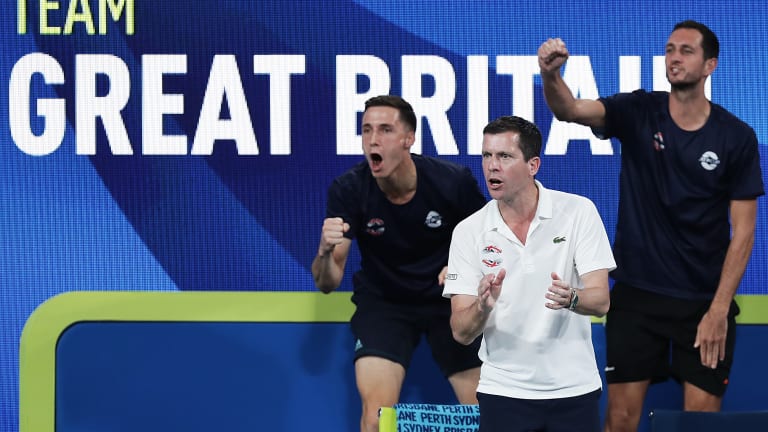
The Tennis Conversation: Tim Henman—Wimbledon, wine & Wedding Crashers
© Getty Images
Advertising
Getty Images
I want to switch gears to an area you're much more involved with: Wimbledon. The grass swing was really the one portion of the tennis season that was completely absent in 2020. What’s the anticipation like behind the scenes… the buildup for hopefully being able to have that back next year?
Yes, first and foremost, you'd like to say growing confidence that The Championships will happen in 2021. I think just to reflect again, as we did a little earlier, when you look back to March, we were in committee meetings that were moving pretty regularly at that time. I remember when Indian Wells canceled that event. That must be an overreaction, I couldn't quite get my head around it. And then it really just triggered a series of events that happened very quickly. When you understand the build time for a lot of different aspects of the lead-in time that was required for the event as a whole, it became very clear, very quickly that the 2020 Championships was not going to be a possibility. I think everyone has wanted to move their mind forward and start looking at 2021. There are huge planning challenges to make that happen. But I've just been on a professional tennis committee call for the last three hours last [Thursday], looking at all different elements of what needs to be implemented for players, their support groups and the grass-court season as a whole. Lots of planning, but quietly, cautiously optimistic that the 2021 Championships will be back again.
Speaking of planning, at the ATP Finals, it became clear that the players leading the PTPA intend on moving this forward next year. As someone who served on the player council during his career, what’s your take on this association, and where it might lead us in 2021?
Look, if you want me to comment on the PTPA—it's not such a crazy idea when you understand the structure. The ATP is a difficult structure, it is 50% players, 50% tournaments. And so if you are the chairperson of that organization, it's very difficult to please everyone. And so the idea that the players would have sole representation, it's not a crazy idea. I think the bit that I struggled with personally, in my opinion, is the timing. In the middle of a pandemic, to have to face these global challenges for everyone in all different walks of life, it's the time to be working together. And so for me, that was the biggest issue.
But certainly, looking ahead, if I were to write my wish list [for] 2021 in tennis terms, we've all got a common goal. We all want this great game to be in a better place, whether that's for players, for tournaments, for fans, for sponsors. We've got an opportunity, and we need to take that opportunity, because there are going to be many more bumps in the road, but greater collaboration would be my number one for 2021. That's the men and the women working more together, I think that's a great strength of our sport.
Having commentated at the ATP Finals, what was it like seeing such a prominent event with no fan presence?
It's an event that I've been to every year for the last 12 years. And the 11 previous years, were the highest attended single week tennis event in history. So that gives you a bit of background to understand. To be back there this year, part of the sort of the player bubble and then going into commentate on those matches in such a fantastic arena with no one in there, it was very strange. I can't deny that I thought the quality of tennis was outstanding. But it was tinged with sadness, because that event in London has been such a success. It really did deserve a proper send off. The players certainly did their best, but to have these empty stands that have been singing and dancing and shouting and screaming for the previous 11 years, to be in silence, was very sad for me.
From 11 years to 25 years… It's going to be silver anniversary of when you won Olympic silver in Atlanta. Looking back now, how much does that medal means to you, given that tennis players seem to be appreciating the opportunity to participate?
If I'm honest, growing up, tennis in the Olympics was never on my radar, it was much more about playing on the main tour, competing in the four Grand Slams, which were and are the cornerstone of our sport. But being a huge sports fan, when I realized that the opportunity of competing at the Olympic Games was there, I wanted to grab it with both hands. I would still say, to this day, the three opening ceremonies that I was part of, in Atlanta, Sydney and Athens were three of the best days in my sporting life.
The doubles in Atlanta, I think it was a classic example of playing with no expectation. I'd never partnered Neil Broad before, he was someone I was just getting to know. And we were very relaxed, our games complemented each other well. As the draw, kind of opened up with some good wins, I think we really had belief that we could go on a great run. In the context of British sports, 1996 was not a good team GB performance. So to be able to contribute at that stage was a huge achievement. There's no doubt in my mind that because tennis has established itself so much more within the Olympic movement, and within the players eyes that, as the years have gone by, I think my Olympic medal means more and more to me, sort of every year. It's something I'm very proud of. My children can really understand the Olympic Games, To have a medal is very, very special.
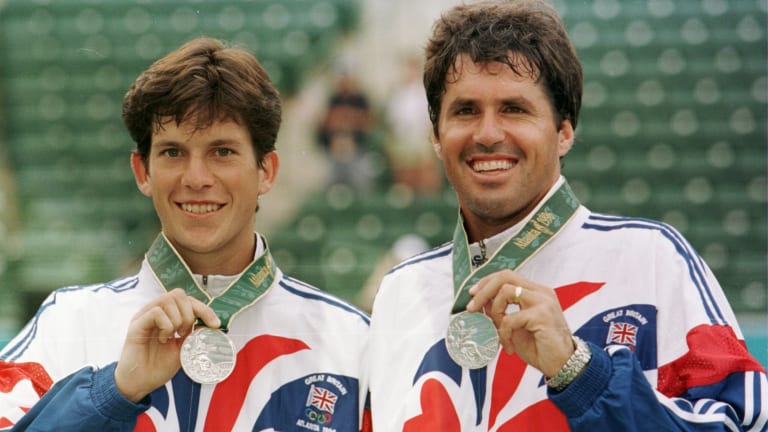
The Tennis Conversation: Tim Henman—Wimbledon, wine & Wedding Crashers
© Getty Images
Advertising
Getty Images
If the Tokyo Olympics get the green light for next summer, do you think this could be one of the top storylines of the year to see who gets gold?
Yeah, definitely. I'm not sure he would win [the] gold medal, but I think, given he's the present holder and twice Olympic singles gold medalist, throw Andy Murray in the mix, I think it could be an amazing storyline. When you hear the greatest players in our sport talking about those opportunities within the Olympic Games, it does make it very, very special. And you can obviously take that conversation to the women as well, when you've seen the Olympic medals that Venus and Serena Williams have won over the years. It just adds credibility to tennis as a part of the Olympic movement. When you look at Murray's wins in 2012, 2016, how much it meant to him as one of the best players in the world and the desire of Djokovic and Federer to try and win that singles Olympic gold is incredibly exciting.
Retirement, I think is going to be another huge topic that people keep an eye on in 2021. You have all these amazing players from this golden era that could potentially be on the way out for several reasons. As someone who was able to kind of have a plan, how do you navigate this difficult chapter as an athlete? Any advice you have after going through it yourself?
I just think it really emphasizes the point that all these players are not going to be around forever. It's so important that we really enjoy them while we can, both men and women, because I think it is one of the most incredible eras in the history of our sport.
I felt very fortunate that I was able to retire in the circumstances that I did. And I think it's very difficult to plan. For me, it really happened in the space of about two or three hours, if I'm honest, I played in Washington, I was working with Paul Annacone, who was my coach at that time. I lost to John Isner, who was fresh on the scene, serving aces galore. And I was struggling a little bit physically, my back wasn't particularly good. I think my game was a little bit stagnant, my ranking was not getting better. And I'd always been traveling to all these events, the biggest and best events believing that I could win them. And that was the first time that I was questioning myself whether I was making up the numbers.
We had two children at that stage, my wife was pregnant with our third. And after I lost to Isner, 7-6, in the third, I went back to the hotel with Paul and we had a few beers and, I said to him, 'for the first time ever, I think this is becoming my job, not my hobby.' And he was very sort of matter of fact. He's obviously so experienced, and he just said, very matter of fact, 'if you're not enjoying it, don't do it.' And that was the first time I've ever even thought about the word retirement. But then when I looked at my schedule, I had the two Masters 1000s in America, the US Open in New York, and then had Davis Cup at home, at Wimbledon, World Group qualifying to get back into the World Group, it was just as if it was right there in front of me. Probably a couple more beers later, it was sort of signed and sealed. I think then that freed me up, I could see the finish line of when I was going to stop. So I always feel very grateful for that.
I was going to save this for the end. But since you brought him up, Paul is part of the Tennis Chanel family. Is there a special story you could share about him, whether it’s embarrassing, something unique to you? Totally fine to come back to that at the end.
I mean, there's so many to choose from. So yeah, give me a little bit more time and I'll think of something.
Okay, great. I know when you were on tour, you were an avid golfer as well. So I'm wondering, have you hit more golf balls or tennis balls once the pandemic allowed for socially distanced playing?
Yeah, not even close. I mean, the last time I really played tennis this year, was at the ATP Cup in January in Sydney. When things opened up from the first lockdown, I've got a good group of friends that would golf a lot. There were quite a few days where we play 36 holes, and get out there and take advantage of a diary that had been freed up and, and weather that was sort of improving at that stage. So yeah, a lot more golf balls have been hit, I really enjoy my golf. I'm probably sort of at the addiction stage.
What's your favorite club in your bag?
I would say my favorite club is sort of a 56-degree sand wedge.
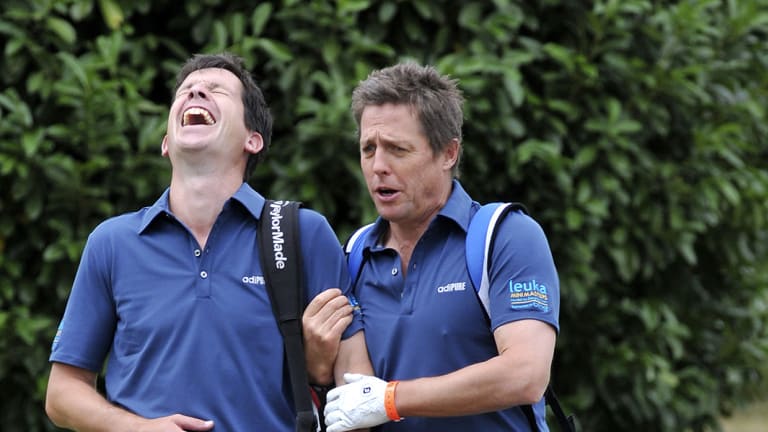
The Tennis Conversation: Tim Henman—Wimbledon, wine & Wedding Crashers
© Verwendung weltweit
Advertising
AP Images
I guess that's not a surprise, you had pretty good touch with the net… Is there a cherished family holiday tradition that has emerged since you've been off the tour that perhaps you wouldn't have been able to do when you were competing?
I'm not sure I could classify it as a family tradition. But I think the freedom that goes with being retired and not having to have the discipline of the tournaments, of training, of travel, of diet and everything else that goes with it. On four or five occasions, we've been away for the New Year, gone to find some winter sun. It's nice to get away from this climate at this this time of year and to see the sun. So we’ve done some good trips to South Africa, to Koh Samui in Thailand, we did Sri Lanka a few years ago. Traveling with family and friends has been very special.
Going along with that, sugar is a big part of the holiday season, it was quite interesting to hear that during the pandemic, Andy Murray, actually reached his peak weight, just from snacking around the house. So to that, do you have a sweet tooth? Or does something else pique your taste buds?
I wouldn't necessarily say I have a sweet tooth, but I get quite thirsty in the evenings. And so wine is one of my big passions. In winter, I don't need many excuses to celebrate something and open a bottle of wine or [have] a glass of champagne. Some might classify it as a weakness. I classify it as a strength.
Red or white?
Anything. (smiles)
If you had to pick one player that you're most interested to watch in 2021, who would you want to keep your eye on?
The obvious one is Federer. I mean, he's a good friend of mine. He's someone I've known for a long, long time, and we're all eager to see him. If and when he's ready to get back out there competing. If I'm going to give you two, I would say Jannik Sinner for sure. I've been very impressed with his progress. His performance against Nadal at Roland Garros was very, very impressive. If Sinner had got that first set under his belt, that could have been a long evening for Nadal. I look at his game and I see a lot of room for improvement. And that I think is what makes it so exciting. Because he's a very, very good player already. But I think his serve can improve. He can get physically stronger, that will aid his movement. He's going to gain experience the more time he's out there. Expecting a big, big year in 2021 for Sinner.
And now Mr. Annacone, I'll give the floor to Mr. Henman to share whatever he wants about you.
Certainly my favorite film, and probably one of Paul's favorite films was Wedding Crashers. And so basically, whenever we communicate, whether that's on the phone or by text or by email, I would say, between 30 and 50 percent of the content is just quotes from Wedding Crashers. So I would think if we had a pound for every time we watched that movie on tour, we would certainly have a fair amount in the piggy bank. But Paul is a great friend of mine first and foremost. I think he's one of the best coaches out there. There's no need to necessarily pass that message on…
Are you talking about the rulebook? Like you guys know some of the things that the two are quoting or are there other one-liners? Because that's what I remember. Rule number 76...
Yeah, play like a champion.
If I went through my phone, it's just a lot of Wedding Crashers chat with him. There's actually a few others. Andy Murray was always keen, Jamie Murray as well. Johan de Beer, my old fitness trainer and physio, Jamie Baker, who's the new tournament director at Wimbledon. Within a group there's quite a common theme when it comes to Wedding Crashers. I heard there was a bit of talk that there might be a second Wedding Crashers film. It would certainly get my support.
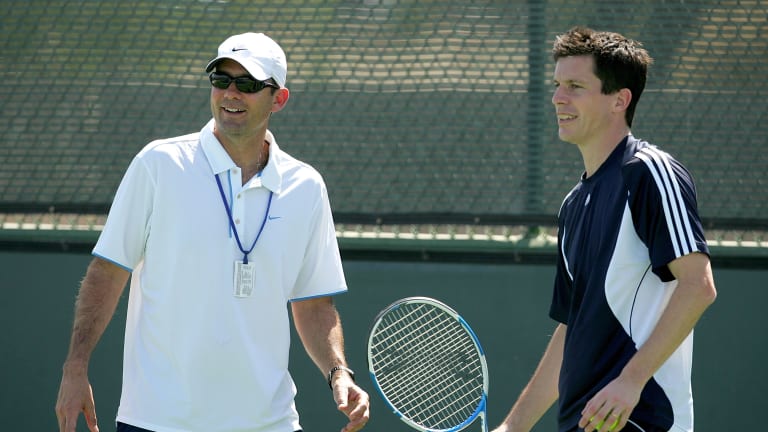
The Tennis Conversation: Tim Henman—Wimbledon, wine & Wedding Crashers
© Getty Images
Advertising
Getty Images